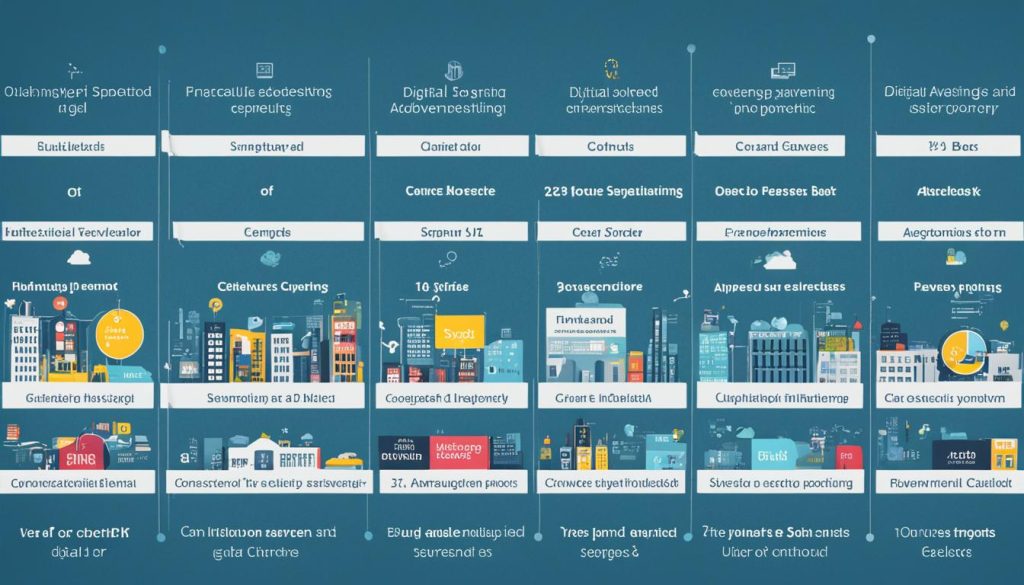Starting a marketing agency in the UK is both thrilling and profitable. But, it needs careful planning. This guide offers step-by-step advice for building a strong marketing business setup. It’s perfect for both seasoned marketers and newcomers. You’ll learn everything you need to start and expand your very own marketing company in the UK.
- Taking the Decision to Start Your Own Agency
- Setting Up Your Marketing Business Successfully
- Essentials for Starting Your Own Agency
- Defining Your Goals and Mission
- Choosing Your Agency Type
- Identifying Your Target Market
- Building a Profitable Business Model
- Driving Traffic with a Successful Website
- Marketing business setup
- Finding and Retaining Clients
- Promoting Your Marketing Agency
- Gaining Skills and Hiring Staff
- Setting Competitive Pricing
- Obtaining Funding and Financial Planning
- Legal Requirements and Regulations
- Scaling and Growing Your Agency
- Source Links
Key Takeaways
- Understand the essential legal and administrative requirements for setting up a marketing business in the UK.
- Explore funding options and financial planning strategies to ensure the long-term viability of your agency.
- Develop a clear vision, set of values, and mission statement to guide the direction of your marketing business.
- Identify your unique selling points and target market to differentiate your agency in the competitive marketing landscape.
- Leverage digital marketing and lead generation strategies to attract and retain high-quality clients.
Taking the Decision to Start Your Own Agency
Thinking of starting your own marketing agency is both exciting and scary. This section looks into when you’re ready to make the move. You need lots of experience, wanting a fresh challenge, and leadership skills. We’ll cover why starting an agency could be a great career step. It’s important to learn how to mix business with your current job.
Signs You’re Ready to Start Your Own Business
If you know a lot about marketing, love being creative and can lead a team, you might be ready. Good agency owners are fired up to push themselves, solve problems and catch market chances. You also need money saved and to be okay with taking some risks when you start.
Reasons to Start Your Own Business
Starting your own agency means more freedom, setting the vision, and the chance to earn more. Plus, you get to build something you love and shape how it feels to work there. The idea of leading your own business and turning your dreams into reality is very motivating for many people.
Starting a Business While Working
Starting a side business while you work elsewhere is popular. It lets you ease into being your own boss, test your ideas, and find clients. You must manage your time well, take small financial risks, and follow the law about tax and business rules. It’s hard to balance a job with a new business, but good planning and hard work can make it work.
Setting Up Your Marketing Business Successfully
This section shares insights from top marketing agency founders. It gives lessons for starting your own business. You learn to keep costs low, focus on what you do best, and how to check if your work is doing well. It’s important to avoid common mistakes when starting a marketing agency. Finding your own special area to work in can help you be noticed in the market.
Lessons for Starting an Internet Marketing Agency
To succeed in an internet marketing agency, plan well and be disciplined. It’s smart to keep costs low, especially at the start, to make a profit and grow sustainably. Stick to what you’re really good at and get others to do things that aren’t essential. This way, you can offer great services without spending too much. Always check how well you’re doing to find ways to get even better.
Mistakes to Avoid When Starting Your Agency
Starting a great marketing agency can be tough, and there are mistakes you should avoid. Don’t promise too much to clients. They might end up unhappy if you can’t deliver. It’s also bad not to be clear about what your agency can really do. This can hurt the trust between you and your clients. Choose work that matches what you do best. Otherwise, it could take you off track and use up your resources.
Finding Your Niche
In marketing, standing out with a unique focus is key to getting and keeping the right clients. Figure out what makes your agency special. This could be focusing on a specific service, industry, or group of people. By specialising, you become the top choice in your field. This makes you more competitive and able to charge higher prices. As your business grows, you can add more to what you offer without losing your unique position.
Essentials for Starting Your Own Agency

Starting your marketing agency means taking on some big tasks first. You’ll need to navigate through registering the agency. You must set up important systems and decide if you’ll work from home or rent an office.
Registering Your Marketing Business
To begin your marketing agency, you need to register it properly. This step includes deciding if you’ll be a sole trader or a limited company. Think about the advantages and responsibilities each brings, including taxes. Make sure to get any licences needed to run your business in the UK.
Setting Up a Business Today
Getting your agency ready means doing some administrative work. These tasks include picking a company name and having a business bank account. It’s very important to get suitable insurance and to have good accounting systems set up. Stay updated with the latest advice from the government as you work through these steps.
Working from Home or Renting an Office
Deciding whether to work from home or rent an office is a big decision. Working from home means less costs and more flexibility. But, it might be harder to keep work and personal life separate. An office can make a good impression, but it costs more. Think about what will work best for your agency and budget.
Defining Your Goals and Mission
Having a clear vision, values, and mission statement is key for your marketing agency. It helps guide its direction and show what your brand is about to clients. You’ll learn here about the essential elements, like integrity, innovation, and focusing on clients. And how to make a mission statement that shows what your agency stands for and sets it apart from the others.
Core Values for a Startup
It’s crucial to have a sharp vision, core values, and mission. This is for getting your team on the same page, attracting the right clients, and steering your agency’s path. You’ll get help here to put together these foundation pieces. This includes stating your long-term goals and determining the beliefs that shape your daily work.
Creating Vision, Values and Mission
Good business ethics are vital for client trust, a positive workplace, and safe operation of your agency. This part stresses the need for ethical behaviour in areas like data safety and how you treat others’ ideas. It also shows how following ethical standards can boost your agency’s name and place in the market.
Importance of Business Ethics
Sticking to strong business ethics is key for client trust, a good workplace, and responsible agency work. This piece highlights the need for ethical handling of privacy, ideas, and behaviour. It shows how these efforts can make your agency more respected and attractive in the market.
Choosing Your Agency Type
The marketing world offers various types of agencies, from full-service to focused boutiques. When you kick off your marketing venture, knowing your agency options is essential. You can pick from classic advertising agencies, those big on design, or digital-first firms. Each one serves different client needs and has its own special offering.
Running a business that provides everything from branding to digital campaigns and media management is a typical choice. These traditional ad agencies cover many fields. If you have an advertising background, this might suit you perfectly.
On the other hand, if you love creating visually stunning brand experiences, a design-focused agency might be your thing. They’re great at making your brand shine across various platforms. This could be ideal for you if design is your passion.
Recently, agencies that solely focus on digital marketing have become popular. These agencies are all about the online world, offering SEO, PPC, email campaigns, and more. If you’re up to date with the newest digital trends, this could be your niche.
Hybrid agencies are also on the rise, offering both specialised and comprehensive services. They provide end-to-end solutions, acting as a one-stop-shop for clients. If you have diverse skills and aim to provide a complete service, this might be the path for you.
It’s crucial for new entrepreneurs to understand their agency options. This helps in selecting the best setup for your expertise, market, and future goals. With the right agency model, your marketing business can thrive in a competitive industry.
Identifying Your Target Market

Finding your target market is key at the start of launching a marketing agency. Look into the biggest industries, the size of businesses, and how far your business will reach. You should know where companies spend most on ads and marketing in the UK and worldwide. This knowledge will guide you in choosing the best areas to focus on for success.
Advertising Spend by Sector in the UK
Every industry spends differently on ads in the UK. It’s important to see which fields are investing the most. Sectors like retail, finance, and telecommunications put a lot into advertising. But, smaller areas might be open for more attention. Learning this can help your agency stand out.
Global Marketing Spend Averages
Looking beyond the UK, think about marketing budgets around the world. This gives you an idea of where your agency can fit in globally. Sectors such as consumer goods and technology often spend more worldwide. Understanding these trends can shape your agency’s future plans.
Digital Ad Spend by Sector
Today, digital marketing is more important than ever. Check out the latest digital ad spending figures to see which sectors are growing fast. Sectors like retail, finance, and tech usually lead in digital spending. Knowing this can help your agency focus on areas with the most opportunity.
Building a Profitable Business Model
It’s key to create a strong and scalable business model for a marketing agency’s success. This part looks into different business model types like retainer-based and project-based. It shows how agencies are changing old models with ideas like subscription billing. This lets agencies pick the best model for what they offer and who they help.
Agency Business Model Types
Marketing agencies come in many shapes, from full-service to focused ones. Owners need to pick a model that fits their talents, the people they serve, and their goals. Models that bring in money regularly are good for steady income. Others let you show your worth with what you deliver.
Reinventing the Agency Model
The way marketing works is changing fast, with clients wanting more clear, flexible, and real outcomes from their partners. Smart agencies are making their models match what clients now need. This means moving on from old billing ways to fixed prices or pay-for-results. They are also using tech better to do their work well and prove their value…
Subscription Billing Strategies
A new way some agencies are working is with subscriptions. Clients pay regularly for ongoing services. This model can make income steady, improve ties with clients, and let agencies give more comprehensive help. But, setting this up right takes thinking about prices, how you handle clients, and making sure you can deliver what they need…
Driving Traffic with a Successful Website
In today’s world, having a top-notch website is vital for any marketing agency to draw in and convert clients. This part will teach you how to build a great agency site. You’ll learn about picking the right design and creating attractive content. We’ll look into making the website easy to use, as well as SEO and improving the rate at which visitors become customers.
Creating a Marketing Agency Website
Your agency’s website does more than just give you an online spot. It should be all about finding and keeping the best leads. Here, we’ll cover adding lead forms, CTAs, and content marketing to boost your visitors. Keeping the website fresh and improving it with regular tests is also key to staying ahead.
Website Design for Lead Generation
The key to a great agency website is in its design for top leads. You’ll see how to add lead forms, CTAs, and use content marketing effectively. Keeping your site updated and tested is crucial, making sure it always brings in the best leads.
Marketing business setup

This part gives a quick look at setting up a marketing business in the UK. It takes info from earlier parts. This list helps new agency owners look at the main things when starting their business.
- Determine the appropriate business structure: Decide whether to register as a sole trader, limited company, or another legal entity.
- Obtain the necessary licences and permits: Ensure compliance with all relevant regulations and industry requirements.
- Establish a strong online presence: Create a professional, lead-generating website that showcases your agency’s capabilities.
- Define your vision, values, and mission: Articulate the core purpose, principles, and long-term aspirations of your marketing business.
- Identify your target market: Thoroughly research the industries, business sizes, and geographic areas that offer the greatest potential for your services.
- Develop a profitable business model: Select the most appropriate pricing structure and revenue streams to support the agency’s growth.
- Secure adequate funding: Explore startup grants, business loans, and other financing options to fund your marketing agency’s operations.
- Assemble a skilled, dedicated team: Recruit the right mix of talent to deliver exceptional client services and drive the agency’s success.
- Implement effective promotional strategies: Leverage a range of marketing tactics to raise awareness and attract new clients.
- Maintain compliance with legal requirements: Ensure the agency’s operations align with all relevant tax, employment, and regulatory obligations.
By carefully addressing these areas, new marketing agency owners can build a solid business. The next parts of this guide will go into more detail on how to do each step. This will help readers make their business dream come true.
Finding and Retaining Clients
Keeping a steady flow of top-notch clients is key for any marketing agency’s success. We will look into some of the best ways to get new clients. This starts with the importance of networking. We’ll share ways to grow your professional network, whether that’s online or in person. This approach can open new doors to find business.
Getting client referrals and using online ads are also critical. We’ll show you how to make use of your current clients to get new ones. Plus, how to use online ads to grab the attention of potential clients.
Networking for New Clients
For marketing agencies, fostering client relationships is very important. By expanding your network, you can find new business chances. You should go to events and engage in online groups. Proactively connecting with people helps grow and refresh your list of potential clients.
Referrals and Existing Networks
Word-of-mouth and referrals are great for bringing in new clients. Make sure you do excellent work and keep great relationships with your clients. This will help you get new clients just by your good reputation. Satisfied clients and contacts in the field might introduce you to others.
Targeted Online Advertising
Marketing agencies can also attract clients through smart online ads. Use tools like Google Ads and LinkedIn. Segmented campaigns with strong creative input will catch the eye of your audience. This is vital for making your online advertising investment count.
Promoting Your Marketing Agency
It’s key for a marketing agency to promote itself well. This helps get the word out about its services and skills to potential clients. We will discuss many ways owners can promote their agencies. These include content marketing, public relations, event sponsorships, and partnerships. The focus is on making sure all promotional efforts match the agency’s brand and speak to its target audience.
One great method to show off the agency’s knowledge is through content marketing. This means creating blogs, videos, or sharing expert insights on the website and social media. The aim is to be seen as a top expert in the field, helping attract new clients.
Getting the agency featured in the media or at industry events can also boost its profile. This might involve getting media spots, speaking at events, or using the agency’s leaders as experts. Through smart PR, the agency can build a stronger brand and more trust with clients.
Joining as a sponsor or partner at events can open up new opportunities. This lets the agency meet more potential clients or partners. Associating with relevant events or businesses can make the agency more visible and respected in the industry.
It’s crucial to make sure all promotional activities match the agency’s image. Incoherent promotions might make the agency seem less trustworthy. A well thought out strategy keeps everything aligned, helping the agency attract its ideal clients.
Gaining Skills and Hiring Staff
To build a successful marketing agency, you need a wide range of skills. This includes the agency owner and the team. We will look at what skills the owners need. For example, they should be good at project management, working with clients, and developing the business. Also, we will see why it’s vital to keep learning and follow the latest trends.
Desired Skills for Agency Owners
Good agency owners have a mix of technical marketing know-how and business skills. They should know:
- Key marketing areas like digital marketing, making content, and looking at data
- How to manage projects well to handle client work and the business’s inner workings
- How to talk and connect with others to create and keep strong relationships with clients
- How to grow the business by finding new chances, selling their services, and making deals
- Understanding finances to keep the agency making money and going strong
- They should always be learning, keeping up with new trends and ways of working
Building an Effective Team
When your agency gets bigger, finding, leading, and keeping talented staff is crucial. This part talks about picking the right skills to add to your team’s strengths. It also looks at how to make a team work well together. For instance, how to welcome new hires, share out tasks, and make a friendly, positive company vibe.
Having a team that’s skilled, varied, and led well helps the agency do outstanding work. It keeps clients happy and brings lasting success. Choosing the right people and creating a workplace that supports them is the way to go. This sets the stage for a great marketing agency.
Setting Competitive Pricing
Choosing the right prices for a business’s services is key. It can greatly affect how much money it makes and how it’s seen compared to others. Factors like what the market usually charges, the kind of services offered, and the business’s standing in its field must be thought of.
Finding the best price can be done by crunching the numbers. It’s about figuring out the costs, what profit is hoped for, and how much value is given to clients. This makes sure the prices are good for the business’s goals and appealing to clients.
Other businesses might choose different ways to set their prices. Some look at what they’ve achieved for clients to decide what to charge – this makes them strive to do the best for their clients. Others prefer to work on a set contract, which keeps money coming in steadily.
No matter the method, what’s key is focusing on what the clients need. The services must meet what the market wants and give the clients a good reason to choose them. Keeping profits healthy while staying competitive is the best way for a business to last and grow over time.
Obtaining Funding and Financial Planning
Many new marketing agencies in the United Kingdom find it hard to get enough funds. This part gives an outline of the funding options available. It includes startup grants, business loans, and other sources of funding. It shows how to make strong financial plans and predictions to help get funds. Such preparation can help agency owners grow their business steadily.
Startup Grants and Loans
In the UK, marketing agencies can get help through startup grants and loans. The Start Up Loans scheme is one way, along with private investors and crowdfunding. Anyone looking to start an agency should explore these options carefully. They should look for what matches their business model and growth plans.
Financial Forecasting
Being able to predict your finances accurately is key to getting funds and managing your cash. This section explains how to make detailed financial forecasts. It focuses on setting clear goals for sales, costs, and making a profit. Regularly checking and updating these plans is crucial. This keeps the agency ready for any changes and success in the long run.
Legal Requirements and Regulations

Starting a marketing agency in the UK means you need to know a lot about laws and rules. This part talks about what you need to do to officially start your business. It includes things like registering, whether you will be a sole trader or a limited company. Plus, you’ll learn about paying taxes and national insurance. Following all these rules from the beginning helps avoid problems later on.
Registering Your Business
To open your marketing agency, you must register your business. You can pick either being a sole trader or forming a limited company. This step involves picking a special name for your business and sharing what it will do. You might also need some specific licences or permits. Doing this early makes sure your agency starts right from the get-go.
Tax and National Insurance
Being your own boss in a marketing agency comes with tax and insurance duties. This bit explains what you need to know about national insurance for the self-employed. It also gives tips on how to handle taxes well. Getting good accounting advice is key to keeping your agency’s finances in good shape. Keeping up with taxes and insurance helps your business run smoothly and stay out of trouble.
Scaling and Growing Your Agency
After laying the groundwork for your marketing agency, it’s time to focus on growth. This stage will look at ways to expand your services, attract more clients, and grow your team efficiently and strategically.
To scale your agency, think about adding new ways to make money. You might start offering services like digital ads, creating content, or managing social media. This helps you meet the changing needs of your clients. Aiming for greater efficiency through technology can also help. For example, automation or using project management tools can make your team more productive. This means you can handle more work without sacrificing quality.
Setting up a structure that can grow with your agency is vital. As your team gets bigger, you’ll need to hand off more tasks and adopt strong systems. These steps ensure that no matter how your agency grows, you keep providing top-notch service. Remember to be flexible and open to change. This way, you’re ready for whatever comes your way and can achieve long-lasting success.












